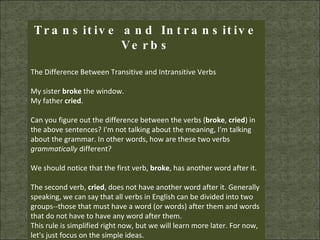
Lay and lie tran intran
- 1. Transitive and Intransitive Verbs The Difference Between Transitive and Intransitive Verbs My sister broke the window. My father cried . Can you figure out the difference between the verbs ( broke , cried ) in the above sentences? I'm not talking about the meaning, I'm talking about the grammar. In other words, how are these two verbs grammatically different? We should notice that the first verb, broke , has another word after it. The second verb, cried , does not have another word after it. Generally speaking, we can say that all verbs in English can be divided into two groups--those that must have a word (or words) after them and words that do not have to have any word after them. This rule is simplified right now, but we will learn more later. For now, let's just focus on the simple ideas.
- 2. Let's look at the two different kinds of verbs. Transitive Verbs My sister broke the window. In the first sentence, the word that comes after the verb, window, is the object of the verb. We say that window is the object because it receives the action of the verb. All objects of verbs receive the action of the verb. Here are some more examples of transitive verbs with their objects: I sold some books. I took the bus. I bought a radio. I understood her question. I wrote a letter. When a verb has an object that receives the action of the verb, we say that the verb is transitive . Transitive verbs are more common on the TOEFL than intransitive verbs, but many students get confused about intransitive verbs
- 3. Intransitive Verbs My father cried . We can see in this sentence that there is no word after cried . In other words, there is no object for the word, so there is no noun to receive the action of the word. Think about it--what could we say? My father cried something . Is there a noun that we could use after cried ? We could probably think of one or two nouns, like tears , or even, good-bye , but normally, we do not use the verb cry with an object. In this case we say that this verb is intransitive because it does not have an object after it. Here are some more examples of intransitive verbs: I slept . I coughed . The glass fell . My cat ran . The sun rose . We should notice that in each case, the subject is doing the action of the verb and nothing receives the action.
- 4. It is extremely important to be able to understand whether a verb is transitive or intransitive. For many verbs in class, if your teacher thinks that the verb is hard to understand, we will ask something like this: T: Do we cry or do we cry something? Then, the student should respond something like this: S: Just cry . In this case, we would say that cry is intransitive. BE CAREFUL!! One reason that understanding this point is so important is that it is very easy to become confused about whether a verb is transitive or intransitive. Consider the following example: I went to the store yesterday. Is went transitive or intransitive? Many people, including native speakers, will tell you that went is transitive since we have many words after went. However: To say that went is transitive would be a BIG mistake!! So, what are all those other words after went? Well, first of all, to the store is a prepositional phrase. Second, yesterday is an adverb. One more thing: just to make life easier, instead of saying transitive and intransitive all the time, we will say vi (since that's what most dictionaries say) if the verb is intransitive and vt (again, since that's what most dictionaries say) if the verb is transitive.
- 5. Practice Transitive and Intransitive Verbs This exercise is relatively simple--just decide whether the verb is transitive or intransitive. In this case, write the answer choice that is more common. Finally, you will notice that several words have been repeated. This is because I want you to remember these words since they are the most common on the TOEFL and they cause the most problems for students Vi or Vt Verb Run Live Throw Sell Eat Result research Vi or Vt Verb Happen Make Exist Send Invent Feed fly
- 7. The only reason these verbs present a problem for anyone is that the past tense of the verb "lie" is identical in appearance to the present tense of the verb "lay." Every verb has three principal parts . Those are the forms of the verb for the infinitive , the simple past tense , and the past participle . You can find the principal parts of a verb in any decent dictionary. Here are the principal parts for the two verbs lie and lay : Verb Infinitive Past Tense Past Participle lie lie lay lain lay lay laid laid So here's the drill: ~ You need to lie down today; yesterday you lay down, in the past you have lain down. ~ Today, you lay the book on the table. Yesterday, you laid the book on the table. In the past, you have laid the book on the table. I hope I have laid this all out clearly enough to allow the proper uses of these two words to lie in the back of your mind, where they will be available to you when you need them.